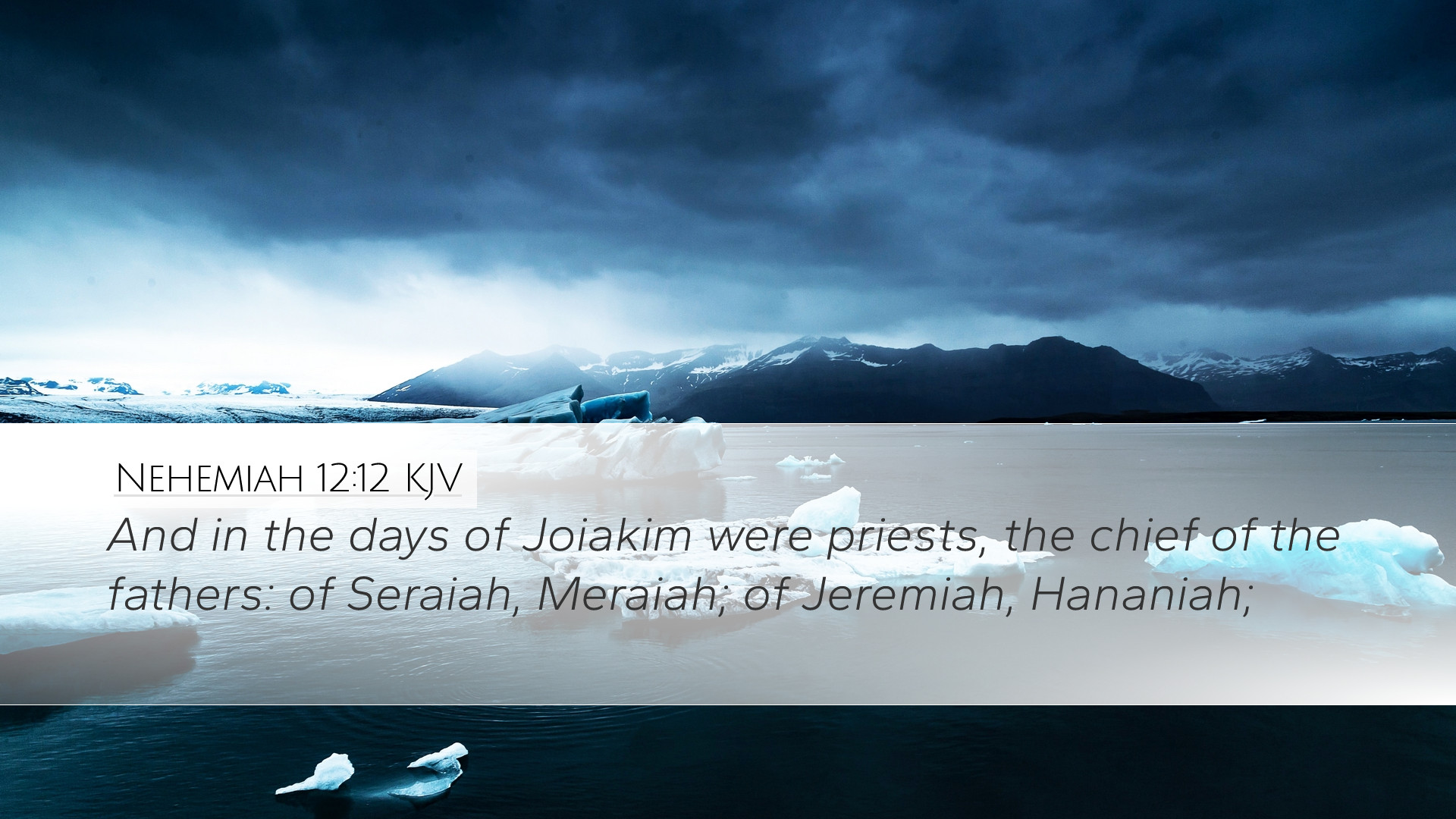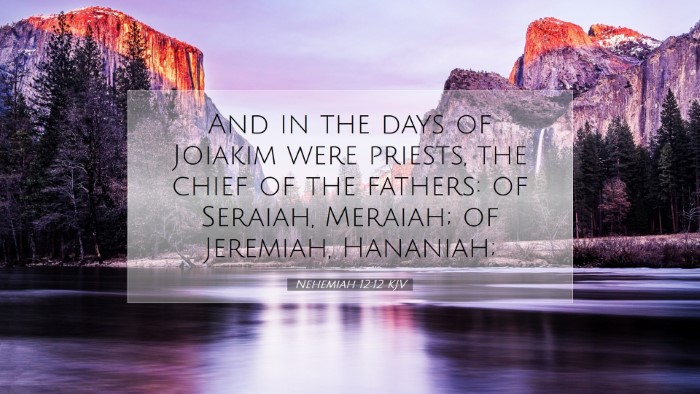Commentary on Nehemiah 12:12
Verse: Nehemiah 12:12 - "And in the days of Joiakim, the sons of Jeshua the son of Jozadak were priests, the chief of the fathers: of Seraiah, Meraiah; of Jeremiah, Hananiah; of Ezra, Meshullam;"
Introduction
The verse from Nehemiah 12:12 highlights the priestly lineage during the time of Joiakim. It signifies the importance of the priesthood in Israel's post-exilic society and serves as a reminder of God's faithfulness in preserving a line of priests to lead His people in worship.
Historical Context
The context of this passage is set in the aftermath of the Babylonian exile. Following the return of the Jewish exiles to Jerusalem, Nehemiah emphasizes the need for proper order and organization within the Levite and priestly ranks. The mention of chief fathers and their lineage is critical in maintaining the continuity of worship and the Law.
Insights from Matthew Henry
Matthew Henry emphasizes that these genealogies serve a dual purpose: they affirm the legitimacy of the priesthood and remind the people of God's providence. Each name listed represents not merely individuals, but the collective memory of God’s covenant people, signifying that the worship of Yahweh is upheld through ordered leadership.
- Significance of Lineage: Henry points out that the spiritual legacy is vital. Each name in this genealogy has a history tied to God's redemptive work, illustrating that God uses families and historical constancy to accomplish His purposes.
- Leadership and Responsibility: The priests mentioned were not only leaders in worship but also bearers of responsibility for the moral and spiritual condition of the nation. Their role was to guide the people in holiness as prescribed in the Law.
Insights from Albert Barnes
Albert Barnes provides a more analytical commentary on the names presented in this verse. He delineates the significance of each priest, underscoring how their lineage ties back to earlier leaders. Barnes notes the importance of a faithful priesthood in re-establishing the religious life of the people after exile.
- The Importance of Continuity: Barnes lays stress on the continuity of priestly functions as crucial to Israel's identity. He suggests that knowing one’s spiritual heritage fosters a greater commitment to the faith.
- The Role of Leaders: Each priestly figure represents a commitment to uphold the duties prescribed in the Mosaic Law, serving as a guiding light for the community.
Insights from Adam Clarke
Adam Clarke’s commentary focuses on the details surrounding the organization of priests during this pivotal period. He notes the generational focus in this verse, indicating stability within the spiritual leadership of the nation.
- Generational Stability: Clarke emphasizes that stability in leadership fosters trust among the people. With a known lineage, there is a better assurance of faithfulness to the Law and tradition.
- Divine Purpose: He also highlights that the genealogical records signify God's continuous work among His people, sustaining them even through trials.
Theological Implications
This verse not only conveys historical information but also provides significant theological reflection points:
- Covenant Faithfulness: The direct lineage from previous priests emphasizes God's unwavering covenant with Israel. The fidelity of the Israelites, as represented by the genealogical record, recalls commitment to God’s commandments.
- Priestly Mediation: The priesthood points toward the ultimate mediation of Christ. Just as these priests were essential for worship and sacrifice, Jesus fulfills and transcends that role, becoming the ultimate High Priest (Hebrews 4:14-16).
- Community Identity: Understanding and embracing our spiritual lineage builds community identity. The church today must recognize its roots in the historical unfolding of God's plan through Israel and to the nations.
- Importance of Structure in Worship: The passage illuminates the significance of structure and order within worship. For pastors and leaders today, understanding the role of organized worship is critical for spiritual health and growth within the congregation.
Conclusion
Nehemiah 12:12 serves as a reminder of the importance of maintaining spiritual heritage and institutional order among believers. Lessons from the priestly family tree elucidate key themes of leadership, legacy, covenant faithfulness, and the necessity of a structured approach to worship. This foundation enriches the understanding for pastors, theologians, and students in their personal and communal faith journeys.


